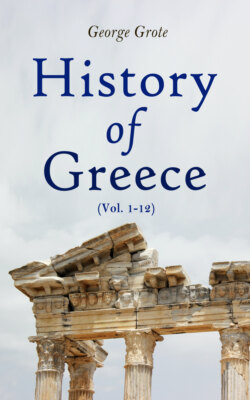Читать книгу History of Greece (Vol. 1-12) - Grote George - Страница 15
На сайте Литреса книга снята с продажи.
CHAPTER VI.
THE ÆOLIDS, OR SONS AND DAUGHTERS OF ÆOLUS.
ОглавлениеTable of Contents
If two of the sons of Hellên, Dôrus and Xuthus, present to us families comparatively unnoticed in mythical narrative, the third son, Æolus, richly makes up for the deficiency. From him we pass to his seven sons and five daughters, amidst a great abundance of heroic and poetical incident.
In dealing however with these extensive mythical families, it is necessary to observe, that the legendary world of Greece, in the manner in which it is presented to us, appears invested with a degree of symmetry and coherence which did not originally belong to it. For the old ballads and stories which were sung or recounted at the multiplied festivals of Greece, each on its own special theme, have been lost: the religious narratives, which the Exegêtês of every temple had present to his memory, explanatory of the peculiar religious ceremonies and local customs in his own town or Dême, have passed away: all these primitive elements, originally distinct and unconnected, are removed out of our sight, and we possess only an aggregate result, formed by many confluent streams of fable, and connected together by the agency of subsequent poets and logographers. Even the earliest agents in this work of connecting and systematizing—the Hesiodic poets—have been hardly at all preserved. Our information respecting Grecian mythology is derived chiefly from the prose logographers who followed them, and in whose works, since a continuous narrative was above all things essential to them, the fabulous personages are woven into still more comprehensive pedigrees, and the original isolation of the legends still better disguised. Hekatæus, Pherekydês, Hellanikus, and Akusilaus lived at a time when the idea of Hellas as one great whole, composed of fraternal sections, was deeply rooted in the mind of every Greek; and when the fancy of one or a few great families, branching out widely from one common stem, was more popular and acceptable than that of a distinct indigenous origin in each of the separate districts. These logographers, indeed, have themselves been lost; but Apollodôrus and the various scholiasts, our great immediate sources of information respecting Grecian mythology, chiefly borrowed from them: so that the legendary world of Greece is in fact known to us through them, combined with the dramatic and Alexandrine poets, their Latin imitators, and the still later class of scholiasts—except indeed such occasional glimpses as we obtain from the Iliad and the Odyssey, and the remaining Hesiodic fragments, which exhibit but too frequently a hopeless diversity when confronted with the narratives of the logographers.
Though Æolus (as has been already stated) is himself called the son of Hellên along with Dôrus and Xuthus, yet the legends concerning the Æolids, far from being dependent upon this genealogy, are not all even coherent with it: moreover the name of Æolus in the legend is older than that of Hellên, inasmuch as it occurs both in the Iliad and Odyssey.235 Odysseus sees in the under-world the beautiful Tyrô, daughter of Salmôneus, and wife of Krêtheus, son of Æolus.
Æolus is represented as having reigned in Thessaly: his seven sons were Krêtheus, Sisyphus, Athamas, Salmôneus, Deiôn, Magnês and Periêrês: his five daughters, Canacê, Alcyonê, Peisidikê, Calycê and Perimêdê. The fables of this race seem to be distinguished by a constant introduction of the god Poseidôn, as well as by an unusual prevalence of haughty and presumptuous attributes among the Æolid heroes, leading them to affront the gods by pretences of equality, and sometimes even by defiance. The worship of Poseidôn must probably have been diffused and preëminent among a people with whom these legends originated.
